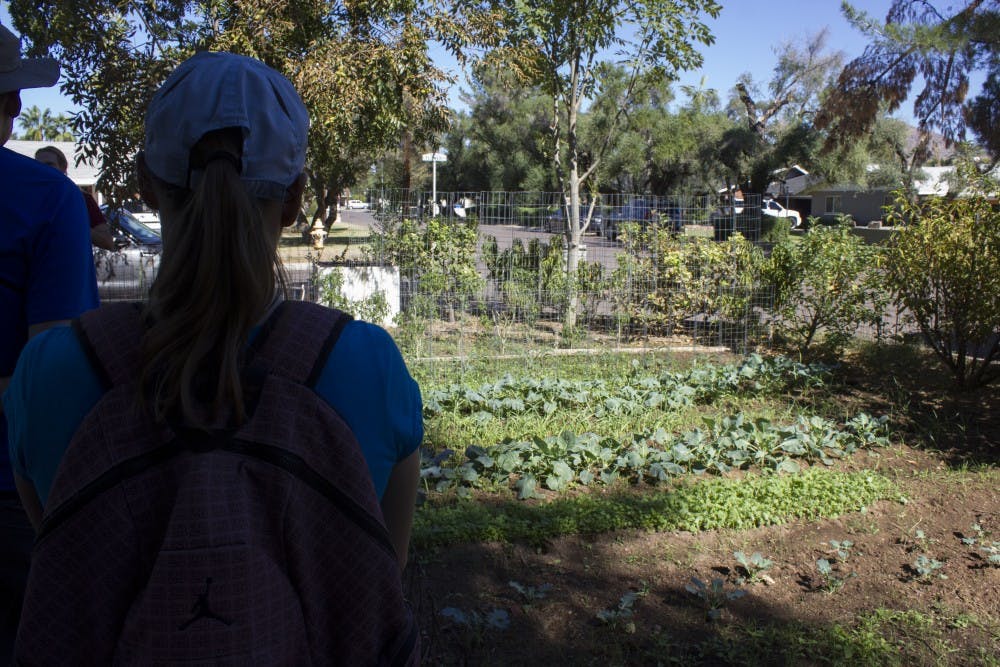A Central Phoenix resident is defying expectations about greenery in the city's center with an urban farm and agricultural center.
David Eberle grows fruits and vegetables, raises chickens, harvests honey and keeps tilapia, all on his property, Care-A-Lot Farm, in the heart of a Phoenix neighborhood.
Eberle sells some of the honey and produce from his gardens and also gives tours in hopes of educating people about where their food comes from and sparking interest in sustainable urban gardening.
“When I eat anything from my yard it’s so flavorful, so intense, that it’s actually really hard to go to a grocery store and buy stuff," he said. "You’ll see that I don’t buy pretty much anything that I grow in my garden and to give other people that experience, that’s profound, and that’s why I try to go out and educate.”
Eberle works as an environmental consultant with a focus on water. In his free time, he spends hours researching the do’s and don’ts of aquaponics: gardening that combines raising fish and growing plants without soil. He has plans to turn a portion of his yard into an aquaponic garden, though he already has two self-sustaining ponds.
“You have fish that consume things and produce wastes and then you have organisms that break down that waste and utilize that waste to grow,” Eberle said. “So, one waste becomes a food source for another, which becomes a food source for another, and so on."
Eberle said he believes there is a disconnect between people and food. He hopes educating people will encourage them to ask questions about where their food comes from.
“The true power is in the consumer, and if you can get that consumer on board, they will shape industry," Eberle said. "Industries only cater to the consumer, and so if the consumers demand real food, as soon as they demand it with their dollar, they’ll get real food."
Eberle was one of the featured gardeners in the Urban Gardens Talk and Tours, sponsored by ASU's Julie Ann Wrigley Global Institute of Sustainability. During the events in the series, gardeners and farmers talk about how they got involved in urban agriculture, how they run their farms and how others can start gardening. Later, the gardeners give a tour of their farms, detailing their practices and answering specific questions.
The talk and tours aim to educate the community on sustainable gardening practices.
Dania Lascola, sustainability senior, helped organize Eberle’s Talk and Tour and hopes the events will get people more involved in gardening and local agriculture.
“Local and organic agriculture is the more sustainable method versus industrial agriculture,” she said. “If you are supporting local agriculture you have less food miles, you know the source of your food, you are interacting with people and you’re not using pesticides typically.”
Landon Allred, a Phoenix resident who attended a recent tour of Care-A-Lot Farm, said he found its self-sustaining structure inspiring.
“I really liked how he started small," Allred said. "He started with very easy things to grow. He didn’t try to do more than he could handle or what was outside of his experience, and so once he did something that worked, he slowly added more.”
Allred said he is interested in gardening but doesn’t have all of the resources to begin a project the size of Eberle’s.
“Right now, I’m in an apartment on the third floor, so it’s not easy, but that’s why I like the starting small and working your way so that once I’m in a house I can do more,” he said. “It’s nice going to something like this where I can get ideas about what works and what doesn’t.”
The next Urban Gardens Talk and Tour will take place Nov. 15 from 6 to 7:15 p.m. at Changing Hands Bookstore and will feature Maya Dailey, a local farmer.
Reach the reporter at cdhenry@asu.edu or follow @carlyhenry_on Twitter.
Like The State Press on Facebook and follow @statepress on Twitter.




